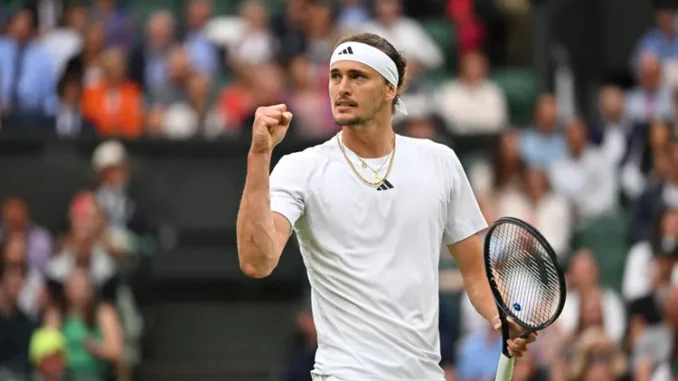
In the ever-evolving landscape of professional tennis, Alexander Zverev, the world’s No. 3 player, has sparked a lively debate with his candid assessment of the sport’s current state. Speaking at a recent event in London, the German star compared the dominance of young phenoms Carlos Alcaraz and Jannik Sinner to the era when Roger Federer, Rafael Nadal, and Novak Djokovic—the legendary Big 3—ruled the courts. Zverev’s remarks, particularly his assertion that “the top five in the world would not have really looked out for the guy who was No. 25” during the Big 3’s peak, highlight a seismic shift in men’s tennis, where depth and unpredictability now define the game.
Zverev, a three-time Grand Slam finalist, reflected on how the sport has transformed since he burst onto the scene as a NextGen hopeful. During the Big 3’s reign, which spanned nearly two decades and produced 66 Grand Slam titles among Federer, Nadal, and Djokovic, the top echelon of players rarely feared upsets from lower-ranked competitors. “We have champions all the way down to No. 30 in the rankings, and that wasn’t the case when I started,” Zverev noted, emphasizing the increased competitiveness across the ATP Tour. Back then, a player ranked No. 25 was unlikely to pose a serious threat to the elite, but today’s game tells a different story. Rising stars and seasoned veterans alike can challenge the best, making every tournament a battleground.
At the heart of this new era are Alcaraz and Sinner, two prodigies who have taken the tennis world by storm. The duo has claimed the last six Grand Slam titles, with Alcaraz, the 22-year-old Spaniard, securing four majors, including the 2025 French Open and Wimbledon, and Sinner, the 24-year-old Italian, defending his Australian Open crown in January 2025. Their dominance, however, differs from the Big 3’s iron grip. “Tennis has changed in the last few years, and I’m not saying Alcaraz and Sinner are better or worse than the Big 3, but they just hit the ball harder and the game has become faster,” Zverev explained. Their aggressive, power-driven style has redefined modern tennis, with blistering groundstrokes and relentless athleticism pushing the sport to new heights.
Despite his admiration for Alcaraz and Sinner, Zverev remains optimistic about his own prospects. “Clearly, Carlos and Jannik are ahead of everyone at the top now, but I am still convinced that I will win a Grand Slam,” he declared. This confidence persists despite setbacks, including a crushing loss to Sinner in the 2025 Australian Open final and a heart-wrenching five-set defeat to Alcaraz at Roland Garros in 2024. Zverev’s resilience is notable, especially after a challenging Wimbledon 2025, where a first-round exit against Arthur Rinderknech plunged him into what he described as a “deep moral pit.” Yet, the German, who won the Italian Open in 2024 and the Bavarian Open in 2025, believes his best tennis is still ahead. “I don’t know where it will be, but I truly don’t care, I know I have the necessary level to achieve it,” he asserted, eyeing the upcoming US Open as a chance to finally claim that elusive major title.
The depth Zverev describes is evident in the current ATP landscape. Players like Andrey Rublev, Daniil Medvedev, and even rising stars such as Jack Draper have proven capable of upsetting top seeds, making tournaments less predictable. During the Big 3 era, only a handful of players—like Andy Murray, who won Wimbledon twice—consistently broke through their dominance. Today, the field is wide open, with potential champions lurking well beyond the top 10. This shift has made the tour more exciting but also more challenging for players like Zverev, who must navigate a gauntlet of talent to reach the pinnacle.
Zverev’s own journey has been marked by highs and lows. His 2023 US Open quarterfinal run, which included a grueling five-set win over Sinner, showcased his return to top form after a devastating ankle injury at Roland Garros 2022. However, his 5-18 record against top-10 players in Grand Slams underscores the mental and tactical hurdles he faces against the sport’s elite. After his Wimbledon loss, Zverev opened up about feeling “very alone out there at times,” admitting to struggles with mental health following his Australian Open defeat to Sinner. “It’s more mental, probably,” he confessed, highlighting the psychological toll of competing in an era where the margins are razor-thin.
As Alcaraz and Sinner continue to set the pace, Zverev’s comments underscore a broader narrative: tennis is in a thrilling transition. The Big 3’s shadow looms large, with Djokovic still active at 38 and Nadal recently retired, but the sport’s future is bright. Alcaraz’s flair and Sinner’s precision have captivated fans, while the depth of talent ensures no match is a foregone conclusion. For Zverev, the challenge is clear—rise above the crowded field and seize his moment. With his talent and determination, the German is poised to keep pushing, proving that even in the Alcaraz-Sinner era, there’s room for new champions to emerge.
Leave a Reply